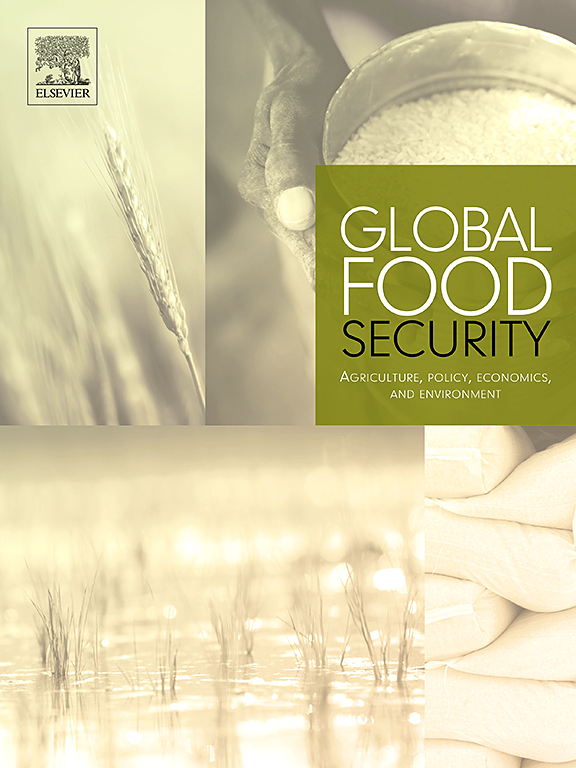重新审视干旱-粮食不安全关系:社会-生态系统视角
IF 9.6
1区 经济学
Q1 FOOD SCIENCE & TECHNOLOGY
Global Food Security-Agriculture Policy Economics and Environment
Pub Date : 2025-07-10
DOI:10.1016/j.gfs.2025.100874
引用次数: 0
摘要
在人类世时代,预计全球干旱频率和严重程度将增加,对实现粮食安全构成重大挑战(可持续发展目标2)。虽然在干旱和粮食不安全研究方面取得了显著进展,但相对较少的研究试图捕捉干旱-粮食不安全关系的内在复杂性,特别是生态和社会系统之间的相互作用和反馈。反馈循环的一个例子是,由于干旱减少了作物产量并加剧了粮食不安全,它还可能导致对灌溉的更大依赖,这反过来又耗尽了水资源,从而加剧了干旱状况。此外,将干旱视为一种自然现象而将粮食不安全视为一种社会现象的传统方法表明,在评估和监测干旱-粮食不安全关系方面存在缺陷。从这个角度来看,我们提出了一种社会生态系统(SES)方法,该方法全面整合了这些维度,强调了干旱-粮食不安全关系特征的复杂相互作用和反馈。我们还提出了在孟加拉国区域干旱-粮食不安全关系背景下开发的概念性SES模型,并讨论了其在未来研究中的意义。我们认为,需要跨部门合作来确定杠杆点和设计政策干预措施,以实现粮食安全目标。我们还建议,未来的研究需要考虑社会和生态系统之间的所有复杂关系和权衡,以便为与到2030年及以后实现粮食安全(可持续发展目标2)相关的可持续政策制定提供信息。本文章由计算机程序翻译,如有差异,请以英文原文为准。
Revisiting the drought-food insecurity nexus: a social-ecological systems perspective
In the era of Anthropocene, drought frequency and severity are projected to increase globally, posing significant challenges in achieving food security (SDG 2). While remarkable progress has been made in drought and food insecurity research, relatively few studies have attempted to capture the inherent complexity of the drought-food insecurity nexus, particularly the interactions and feedback between ecological and social systems. An example of a feedback loop is that, as drought reduces crop production and heightens food insecurity, it can also lead to greater reliance on irrigation, which in turn depletes water resources, thereby exacerbating drought conditions. Moreover, the traditional approach of viewing drought as a natural phenomenon and food insecurity as a social phenomenon indicates flaws in assessing and monitoring the drought-food insecurity nexus. In this perspective, we propose a social-ecological systems (SES) approach that holistically integrates these dimensions, emphasizing the complex interactions and feedback that characterize the drought-food insecurity nexus. We also present a conceptual SES model developed in the context of the regional drought-food insecurity nexus in Bangladesh and discuss its implications in future research. We argue that cross-sectoral collaboration is needed for identifying leverage points and designing policy interventions to achieve food security targets. We also suggest that future research needs to consider all the complex relationships and trade-offs between social and ecological systems to inform sustainable policy development relating to achieving food security (SDG 2) by 2030 and long-after.
求助全文
通过发布文献求助,成功后即可免费获取论文全文。
去求助
来源期刊

Global Food Security-Agriculture Policy Economics and Environment
FOOD SCIENCE & TECHNOLOGY-
CiteScore
20.90
自引率
3.40%
发文量
69
期刊介绍:
Global Food Security plays a vital role in addressing food security challenges from local to global levels. To secure food systems, it emphasizes multifaceted actions considering technological, biophysical, institutional, economic, social, and political factors. The goal is to foster food systems that meet nutritional needs, preserve the environment, support livelihoods, tackle climate change, and diminish inequalities. This journal serves as a platform for researchers, policymakers, and practitioners to access and engage with recent, diverse research and perspectives on achieving sustainable food security globally. It aspires to be an internationally recognized resource presenting cutting-edge insights in an accessible manner to a broad audience.
 求助内容:
求助内容: 应助结果提醒方式:
应助结果提醒方式:


